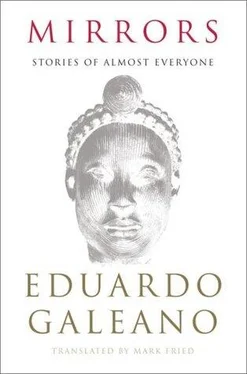José Leandro Andrade did not say much. He did not celebrate his goals or his loves. When he danced past defenders with a ball glued to his foot, he moved with the same haughty gait and absent expression as when he danced the tango with a woman glued to his frame.
In the Olympics of 1924, he astonished Paris. The crowds were delirious, the press called him “the Black Marvel.” Fame brought dames. Letters rained down on him, none of which he could read. They were written on perfumed paper by ladies who exposed their knees and blew smoke rings from long, gold cigarette holders.
When he returned to Uruguay, he brought back a silk kimono, gray gloves, and a wristwatch.
All this was soon over.
In those days, soccer was played for wine and food and pleasure.
He sold newspapers on the street.
He sold his medals.
He was the first black star of world soccer.

In the museums of Paris, writer Fatema Mernissi saw the Odalisques painted by Henri Matisse.
They were harem flesh: voluptuous, indolent, obedient.
Fatema looked at the dates on the paintings, compared, and confirmed: when Matisse portrayed Turkish women like that, in the twenties and thirties, they were well on their way to becoming full citizens, gaining entry to the university and Parliament, winning the right to divorce, and tearing off the veil.
The harem, a lockup for women, had been outlawed in Turkey, but not in Europe’s imagination. Virtuous gentlemen, monogamous in their wakeful hours and polygamous in their dreams, could enjoy free passes to that exotic paradise, where empty-headed, tight-lipped females delighted in pleasing the male jailer. Any mediocre office worker could close his eyes and become a powerful caliph, caressed by a multitude of naked belly-dancing virgins vying for the favor of a night alongside their lord and master.
Fatema had been born and raised in a harem.

He was one, he was many, he was everyone, he was no one.
Fernando Pessoa, sad bureaucrat, prisoner of the clock, solitary author of love letters never sent, carried an insane asylum around inside himself.
Of the denizens, we know their names, the dates and even hours of their births, their astrological signs, weights, and heights.
And their works, because they were all poets.
Alberto Caeiro, pagan, mocker of metaphysics and other intellectual acrobatics that reduce life to concepts, wrote burps.
Ricardo Reis, monarchist, Hellenist, child of classical culture, who was born several times and had several astrological signs, wrote constructions.
Álvaro de Campos, engineer from Glasgow, vanguardist, who studied energy and feared losing his zest for life, wrote sensations.
Bernardo Soares, master of the paradox, prose poet, scholar, who claimed to be an unwilling aide in some library, wrote contradictions.
And Antonio Mora, psychiatrist and nutcase, interned at Cascais, wrote lucubrations and locobrations.
Pessoa also wrote. When the others slept.

From the start of the twentieth century, a mechanized bell announced each day’s opening and closing on the New York Stock Exchange. The pealing tones paid homage to the self-sacrificing labors of the speculators who make the world go round, determine the value of goods and countries, manufacture millionaires and mendicants, and are capable of killing more people than any war, plague, or drought.
On October 24, 1929, the bell rang cheerily as ever on the worst day in the entire history of that cathedral of finance. Its collapse closed banks and factories, sent unemployment skyrocketing, and pushed wages down the basement stairs. The entire world got stuck with the bill.
U.S. Treasury Secretary Andrew Mellon consoled the victims. He said the crisis had its advantages, because “people will work harder and lead a more moral life.”
FORBIDDEN TO WIN ELECTIONS

So people would work harder and lead a more moral life, the Wall Street crash brought down the price of coffee and with it the elected government of El Salvador.
The reins of the country were seized by General Maximiliano Hernández Martínez, who liked to use a magic pendulum to find poison in his soup and enemies on the map.
The general called democratic elections, but the people abused the opportunity. The majority voted for the Communist Party. So the general had to annul the vote and a popular revolt erupted, as did Izalco volcano after many years asleep.
Machine guns reestablished the peace. Thousands died. How many, no one knows. They were peons, they were poor, they were Indians: the economy called them “the labor force” and death called them “unidentified.”
Indigenous leader José Feliciano Ama had already been killed several times when he was hanged from the branch of an olive tree. And there he was left to swing in the breeze, a civics lesson for schoolchildren brought from all over the country.

So people would work hard and lead a more moral life, the crash on Wall Street also made the price of sugar nosedive.
The disaster severely punished the islands of the Caribbean and gave Brazil’s northeast the coup de grâce.
No longer the world’s sugar bowl, not nearly, the northeast became the most tragic casualty of sugarcane monoculture.
Some years before it got sacrificed on the altar of the world market, this immense desert was green. Sugar murdered the forest and the fertile lands. Now the northeast produced ever less sugar and ever more thorns and criminals.
In those solitudes lived the dragon of drought and the bandit Lampião.
At the start of each workday, Lampião would kiss his knife:
“Are you feeling brave?”
“Brave? I couldn’t say. I’m in the habit.”
In the end, he lost his habit and his head. Lieutenant João Bezerra decapitated him for a reward of twelve automobiles, by which time the government had forgotten that it awarded Lampião the rank of army captain so he would hunt down Communists. They displayed triumphantly his confiscated assets: a Napoleon hat covered in little coins, five fake diamond rings, a fifth of White Horse whiskey, a bottle of Fleurs d’Amour perfume, a waterproof cloak, and various other knickknacks.
FORBIDDEN TO BE A COUNTRY

Under his broad-brimmed hat, he disappears.
Since 1926, a flea named Augusto César Sandino has been driving the invading giant crazy.
Thousands of Marines have been in Nicaragua for years, but the heavy military machine of the United States cannot manage to swat the leaping army of patriotic peasants.
“God and the mountains are our allies,” Sandino says.
And he says that he and Nicaragua also have the good luck of suffering from a severe case of latinamericanitis.
Sandino has two secretaries, his two right hands: one is Salvadorean, Augustín Farabundo Martí, the other Honduran, José Esteban Pavletich. General Manuel María Girón Ruano, a Guatemalan, is the only one who knows how to work the little cannon they call “Cutie,” which in his hands can shoot down airplanes. In battle, several men have won positions of command: José León Díaz, a Salvadorean, Manuel González, a Honduran, the Venezuelan Carlos Aponte, the Mexican José de Paredes, the Dominican Gregorio Urbano Gilbert, and the Colombians Alfonso Alexander and Rubén Ardila Gómez.
Читать дальше


















